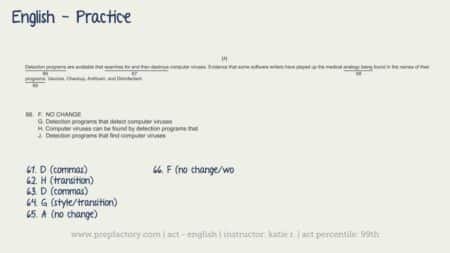
Taking the ACT English Section
Taking the ACT English test is easier than you might think. There are plenty of practice questions and tips available online. By studying the sample tests and using a ACT study guide, you will have a better idea of what to expect on the ACT. Getting a practice book will help you practice writing essays, but there are also other tips that you should know before you take the exam. Keeping these tips in mind will ensure that you can score high on your English SAT test!
Using pronouns correctly on the ACT is essential
While they aren’t as critical as verbs and other subject/verb agreement questions, they are crucial to ensuring that your sentences flow smoothly. The ACT is strict on using the correct pronouns, so students should make sure to follow these guidelines to score higher on the test. The only exception to this rule is the use of the singular form. Rather than using the plural form, students should avoid this.

There are four types of ACT English section questions. The first is a multiple-choice question, which asks students to choose the correct form of a sentence. The answer choice must pair with the underlined part. The other two options are going, have gone, and have. For the third question, students must decide which of these options matches the underlined part. Depending on the answer choice, students should also remember to use the proper pronouns for the last three.
The second type of question is a multiple-choice question
This question requires students to identify the subject of an answer and then choose a pronoun to indicate that person. The second type is an essay. This is the only essay that requires a student to use a pronoun. Regardless of which type you choose, it’s vital to remember to write clearly and in a consistent manner. The ACT English section will be timed and you’ll need to plan ahead.
The ACT English section is a multiple-choice question that includes five passages and 15 questions. You can choose from several options for the questions, and the ACT doesn’t use different words for each question. It just focuses on the content of the passages. The other questions are in the form of a narrative. It’s best to read the paragraphs and answer them with care. You need to be able to see the topic of the ACT essay to make an accurate choice.
The ACT English section is a test of grammar and style
You’ll need to learn how to use pronouns in different contexts. If you don’t know how to use pronouns in a sentence, don’t guess. It’s likely that your answers won’t be correct. It’s best to use only the correct form of the word to create an appropriate structure.
ACT English test preparation can be difficult, but it’s important to keep the sections simple and focused. You don’t have to master all parts of the ACT, but you’ll need to know what to prepare for. There are plenty of strategies to use on the ACT English test. The ACT English section requires you to learn how to use the correct form of the word. This is the only way to ensure a high score.
The ACT English test is structured similarly to the ACT Science section
You’ll be given a short passage and asked multiple-choice questions related to the parts of the passage. On the ACT, you’ll be asked to analyze the writing in the passage. Depending on the length of the passage, you will be asked to suggest changes to the text. You’ll also be asked to answer questions that ask about the structure and logic of the passage.
Identifying grammar rules in everyday life is the easiest way to score well on the ACT English section. Try to answer questions sentence by sentence. This will save you time and effort when you’re answering punctuation and grammar questions. The ACT English exam will not let you use the same words for a sentence as you would in a sentence-by-sentence format. But if you want to score well on the ACT, make sure you study for the exam in advance!

Comments (0)